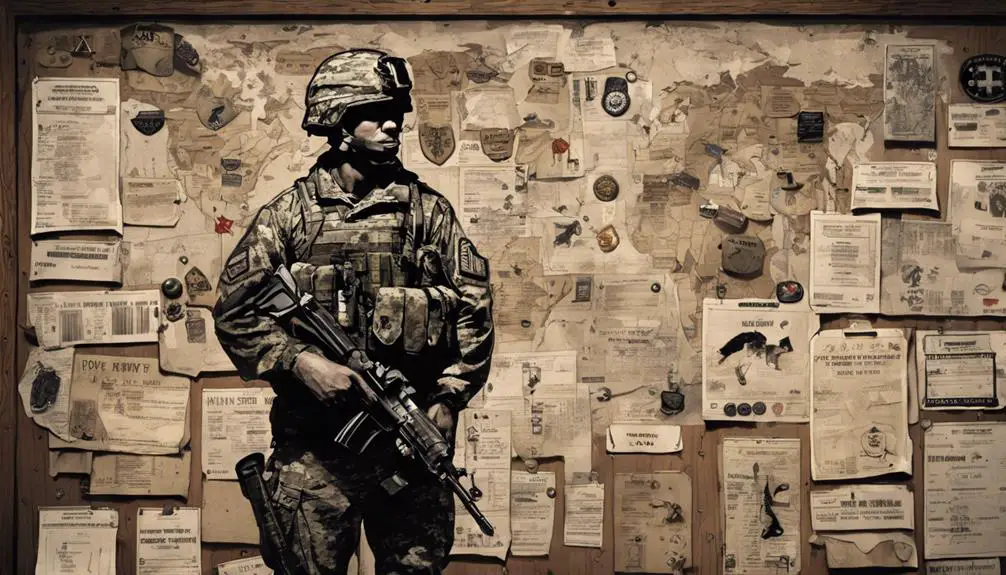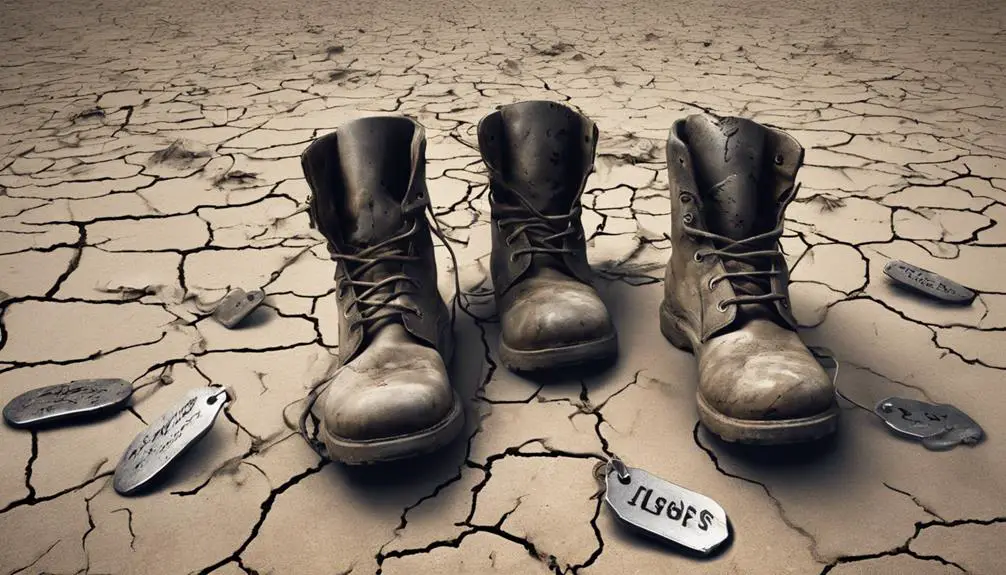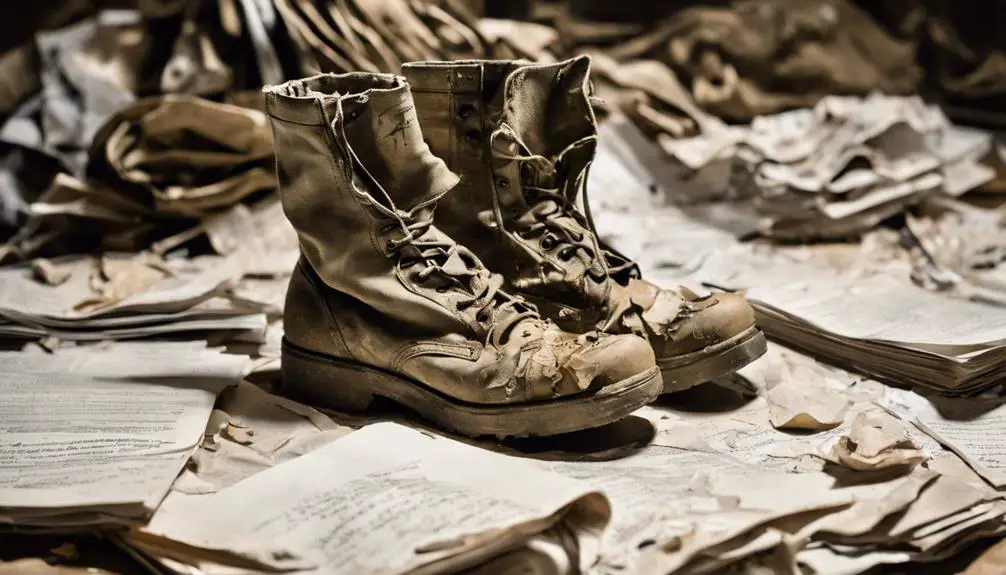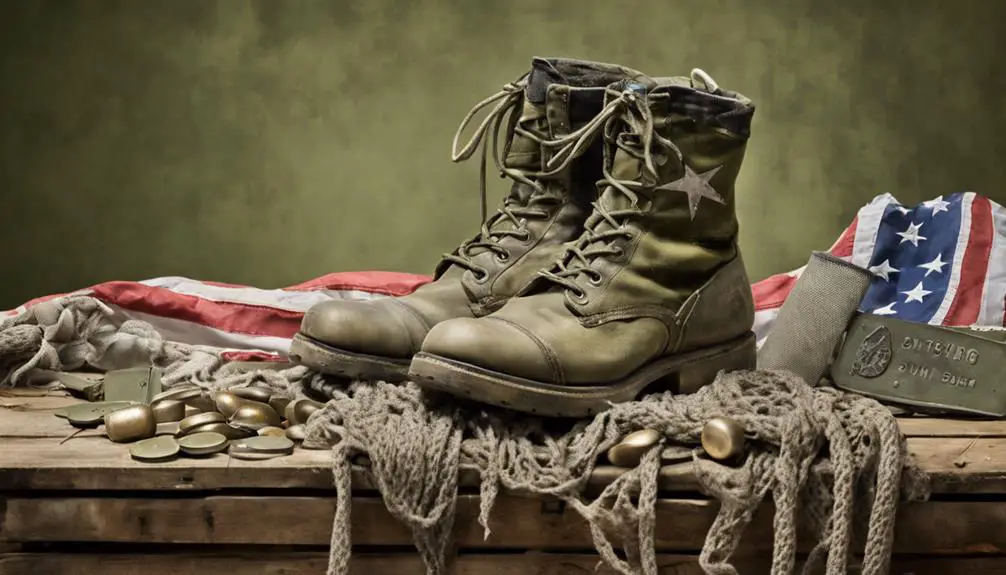You're entering a world of unfamiliar terminology, where "o-dark-thirty" means an early morning, "rack time" is sleep, and "chow" is food. You'll hear "grunt" to describe an enlisted soldier, "squid" for a Navy sailor, and "butterbar" for a second lieutenant. "Situational awareness" means staying alert, while "casing the joint" means surveying an area. You'll come across "SITREP" for situation reports and "CAS" for close air support. From "bugging out" to "foxhole blues," military slang can be overwhelming. Dig in to uncover the nuances of military jargon and discover the lingo that will have you communicating like a seasoned pro.
Essential Terms for New Recruits

You'll need to familiarize yourself with these essential terms to navigate military life, starting with the most common slang used in boot camp and beyond. Understanding Boot Camp Basics is vital to adapting to the Military Mindset.
From the get-go, you'll be immersed in a world of acronyms, jargon, and colloquialisms that'll make your head spin. But don't worry, we're here to assist you.
First off, let's tackle the basics.
'O-dark-thirty' refers to an ungodly early hour, usually around 4:30 am.
'Rack time' means it's time to hit the sack, while 'chow' is, well, food.
You'll also hear 'latrine' instead of bathroom, and 'squad' instead of team. These may seem insignificant, but trust us, they're essential to blending in.
As you progress through boot camp, you'll encounter more specialized terms.
'Drop and give me 20' means you've got some push-ups to do, pronto!
'Hooah' is a way to express enthusiasm or agreement.
Mastering these terms will help you build camaraderie with your fellow recruits and demonstrate your commitment to the Military Mindset.
Slang for Ranks and Roles
Master the slang for ranks and roles to navigate the military hierarchy with confidence, starting with 'grunt' for an enlisted soldier and 'squid' for a Navy sailor. You'll soon find that officer nicknames are just as colorful, with 'butterbar' for a second lieutenant and 'full bird' for a colonel.
When it comes to Enlisted hierarchies, you'll hear 'E-1' to 'E-9' to describe the different pay grades. Don't be surprised if you're referred to as a 'PFC' (Private First Class) or an 'NCO' (Non-Commissioned Officer). In the Navy, you might be a 'seaman recruit' or a 'petty officer.'
Understanding these terms will help you communicate effectively with your fellow service members and show respect for the chain of command. Remember, using the right slang can make you sound like a seasoned pro, while misusing it can make you stand out like a sore thumb.
Tactical and Mission Lingo

Get familiar with tactical and mission lingo to maintain alignment with your unit during ops, where 'situational awareness' means staying alert to your surroundings and 'pacing' refers to maintaining a steady tempo during a patrol.
You'll encounter these terms frequently in combat zones, where every second counts. 'Bounds' refer to the limits of a designated area, while 'casing the joint' means to survey an area before entering.
During a mission, you might receive orders to 'sweep' an area, which means to search it systematically. After the op, you'll participate in a 'mission debrief', where you'll discuss what went right and wrong.
Understanding these terms will help you stay focused and effective in high-pressure situations. Familiarize yourself with these terms to make sure you're on the same page as your unit, and to stay one step ahead of the enemy.
Common Military Acronyms
Military personnel rely heavily on acronyms to convey complex information quickly and efficiently, and understanding these abbreviations is essential to effective communication in high-stress environments. You'll often hear phrases like 'SITREP' (Situation Report) or 'CAS' (Close Air Support) in military conversations. But have you ever wondered where these acronyms come from?
Acronym origins can be traced back to the early 20th century, when militaries began using abbreviations to simplify communication. Over time, these abbreviations evolved into the acronyms we use today. The table below highlights a few examples:
| Acronym | Meaning | Origin |
|---|---|---|
| ASAP | As Soon As Possible | WWII-era phrase |
| CO | Commanding Officer | British Army, WWI |
| SOP | Standard Operating Procedure | US Army, 1950s |
Understanding the origins and evolution of these acronyms can help you better comprehend military communication. As you learn more about these abbreviations, you'll become more skilled at engaging in military conversations.
Slang for Emotions and Situations

When you're in the trenches, you'll hear military personnel tossing around slang terms to describe their emotions and situations, like 'bugging out' to convey a hasty retreat or 'having a bad case of the Mondays' to describe a bad day. These phrases help soldiers express complex emotions in a concise and relatable way.
For instance, 'Battle Fatigue' is a slang term used to describe the physical and mental exhaustion that comes with prolonged combat. You might hear a fellow soldier say, 'I'm feeling pretty battle-fatigued after that last op.' It's a way to acknowledge the toll that combat takes on the body and mind.
Another common phrase is 'Foxhole Blues,' which refers to feelings of sadness, loneliness, or homesickness. If a soldier says they're experiencing Foxhole Blues, it means they're struggling to cope with the emotional demands of military life.
Boots' Guide to Radio Chatter
You'll need to master radio communication skills to stay alive on the battlefield, where clear and concise communication can mean the difference between life and death. As a soldier, you'll rely heavily on radio chatter to receive and transmit vital information. To guarantee effective communication, it's imperative to follow established radio etiquette guidelines.
When using the radio, adhere to standard chatter patterns to avoid confusion and miscommunication. Keep your transmissions brief and to the point, avoiding unnecessary chatter.
Use clear and concise language, avoiding slang or jargon that may be unfamiliar to others. Identify yourself and your unit clearly at the start of each transmission, and be mindful of your tone and volume.
Decoding Military Jargon

From 'Hooah' to 'SITREP,' military jargon is filled with cryptic phrases and abbreviations that can leave even seasoned soldiers scratching their heads. As you explore the world of military slang, you'll discover that deciphering these terms is essential to understanding the cultural significance of military communication. You'll find that many phrases have historical roots, dating back to World War I and II, while others are more recent additions. For instance, 'Hooah' originated from the World War II-era 'Hoo-ah,' a phrase used to express excitement or agreement.
As you navigate military jargon, you'll notice that abbreviations like 'SITREP' (Situation Report) and 'OPSEC' (Operational Security) are used to convey complex information quickly and efficiently. These terms have become an integral part of military culture, allowing soldiers to communicate effectively in high-pressure situations.
Frequently Asked Questions
Can I Use Military Slang in Non-Military Contexts?
You're wondering if you can use military slang in everyday life. The answer is, it depends.
While some terms may have crossover appeal, others might confuse or alienate civilians. To achieve successful civilian integration, consider your audience and context.
Using military slang can add flair to your language, but be mindful of your listeners' familiarity with the terms. Use them sparingly and appropriately to avoid confusion or offense.
Are There Differences in Slang Between Military Branches?
Are you surprised that different military branches have their own lingo? You shouldn't be! Each branch develops its unique dialect, shaped by its specific culture and history.
You'll find branch dialects and service nuances that set them apart. For instance, the Navy's 'deck' refers to the ship's floor, while the Army's 'deck' means a stack of papers.
These differences reflect each branch's distinct identity and operational needs.
Is Military Slang Only Used by Enlisted Personnel?
You might think military slang is exclusive to enlisted personnel, but that's not the case. In reality, officers also use slang, albeit in a more nuanced way.
Officer culture and the rank hierarchy influence the type of slang used, with officers often adopting more polished, professional language. While enlisted personnel may use more colloquial slang, officers use terminology that reflects their leadership role and expertise.
Can Military Slang Be Used in Formal Military Communications?
You might be surprised to know that 80% of military communications are verbal, leaving room for slang to creep in.
But can you use military slang in formal military communications? Generally, the answer is no. Formal exceptions aside, official protocol dictates strict adherence to standardized language to guarantee clarity and precision.
You'll find no room for colloquialisms in official reports or briefings. Stick to formal language to avoid confusion and maintain professionalism.
Is Military Slang Officially Recognized by the Military?
You might wonder if military slang is officially recognized by the military. The answer is, it's not explicitly recognized in regulation standards or official documentation.
While slang is widely used in informal communications, formal military communications adhere to standardized language to guarantee clarity and precision. Official documentation, such as field manuals and operational protocols, rely on formal terminology to maintain consistency and avoid confusion.
Conclusion
You've made it through the crash course on military slang! Now, you're ready to hit the ground running. Remember, in the military, communication is key, and speaking the language is vital.
Don't be left in the dark – stay frosty and keep your ears open for these essential terms. When in doubt, break a sweat and ask your CO for clarification.
With time and practice, you'll be speaking like a pro in no time. Stay sharp, and don't get left behind!







